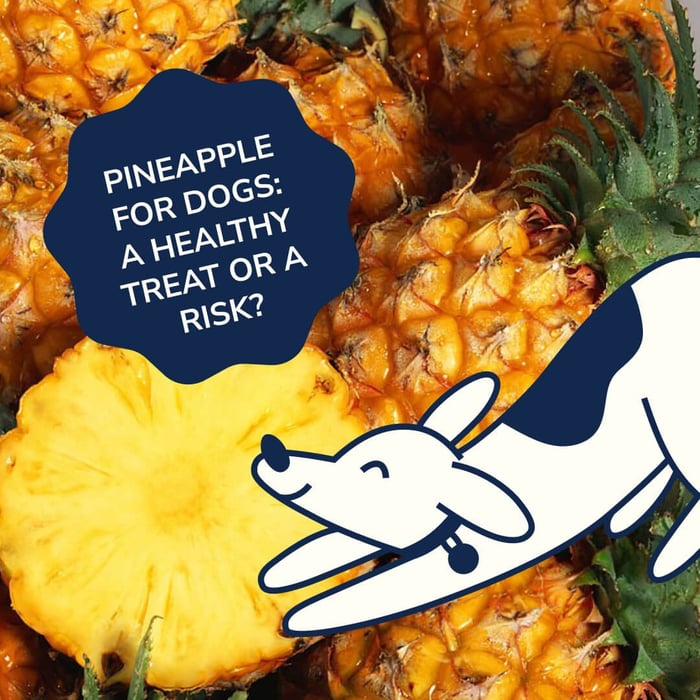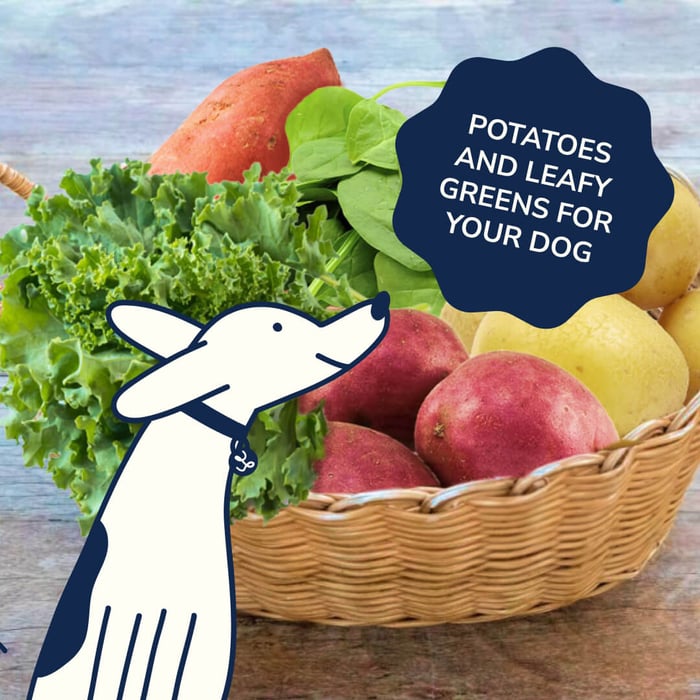As I walked to the supermarket this week, I stumbled upon an incredibly tasty pineapple that I just couldn’t resist. After bringing it home, I found myself in a familiar situation as a proud mom of two Westie puppies—should I share this delicious tropical treat with my dogs? Like many pet parents, I want to spoil my pups with new and exciting foods, but I also need to be sure what’s safe. So, I decided to dig a little deeper into whether pineapple for dogs can be a healthy and safe addition to their diet.
In this article, I’ll explore the pros and cons of pineapple for dogs, dig into its nutritional value, and provide guidelines on how to safely introduce it into your dog's diet.
The Nutritional Benefits of Pineapple
Pineapple is a nutrient-dense fruit, packed with vitamins, minerals, and antioxidants that are beneficial for both humans and dogs alike. Let’s break down what makes pineapple for dogs a potential health booster.
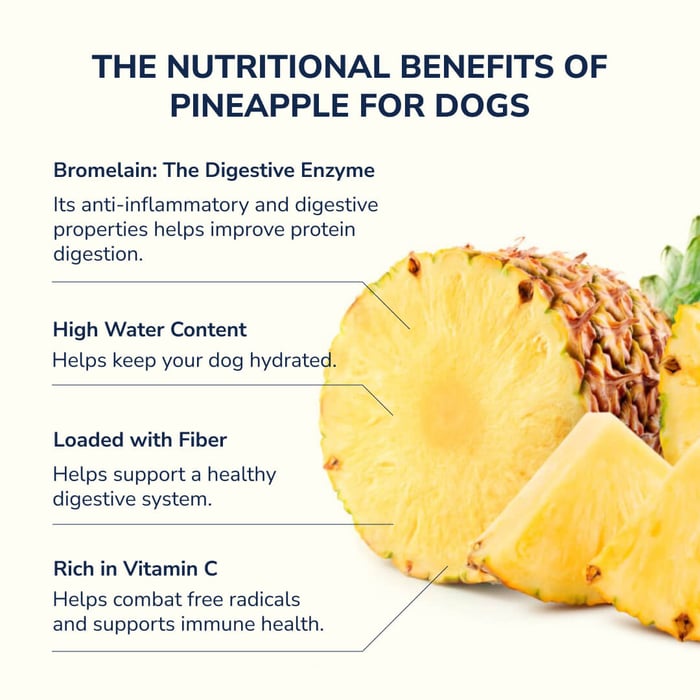
1. Rich in Vitamin C
With the colder months upon us, both humans and pets are more susceptible to the effects of seasonal changes. Vitamin C acts as a powerful antioxidant, helping to combat free radicals in the body and support immune health. For dogs, this extra boost can be especially beneficial during the season of colds, potentially helping them fend off infections and inflammation. Although dogs can naturally produce their own Vitamin C, adding a bit more from natural sources like pineapple can provide an added layer of immune support, especially for aging dogs or those with health concerns.
2. High Water Content
Hydration is key to your dog’s health, especially during warmer months or after physical activity. Pineapple is composed of roughly 86% water, making it a refreshing snack that can help keep your dog hydrated, particularly on hot days.
3. Bromelain: The Digestive Enzyme
One of pineapple’s unique features is an enzyme called bromelain. Known for its anti-inflammatory and digestive properties, bromelain can help improve protein digestion in dogs, which is particularly helpful for pets that may have minor digestive sensitivities.
4. Loaded with Fiber
Pineapple contains both soluble and insoluble fiber, which can support a healthy digestive system in dogs. Fiber promotes better bowel movements and can help manage weight by making your dog feel full longer. However, it’s important to remember that too much fiber can lead to gastrointestinal discomfort in dogs, so moderation is key.
5. Other Essential Vitamins and Minerals
Pineapple is a good source of key vitamins such as Vitamin B6, essential for brain health and energy regulation, and manganese, a mineral that supports bone health and metabolism. It also contains traces of potassium, which helps maintain a healthy heart function in dogs.
Can All Dogs Eat Pineapple?
While pineapple for dogs offers a range of nutritional benefits, it’s important to remember that not all dogs are the same. Factors such as your dog’s size, breed, age, and health conditions can influence whether pineapple is an appropriate treat.
1. Allergies or Sensitivities
Just like humans, dogs can have food allergies or sensitivities. Pineapple may cause an allergic reaction in some dogs, resulting in symptoms like itching, hives, or gastrointestinal upset. If you’re introducing pineapple for the first time, start with a small amount and observe your dog for any adverse reactions.
2. Diabetes or Weight Management Concerns
Although pineapple contains beneficial nutrients, it is also relatively high in natural sugars. If your dog is diabetic or prone to weight gain, pineapple should be given sparingly, as too much sugar can lead to blood sugar spikes or contribute to obesity.
3. Digestive Health
While bromelain can aid digestion, too much pineapple can cause digestive problems, such as diarrhea or vomiting. This is particularly true for dogs with sensitive stomachs. If your dog has a history of gastrointestinal issues, it may be best to avoid pineapple or consult with your veterinarian before offering it.
How much Pineapple Can I Give My Dog?
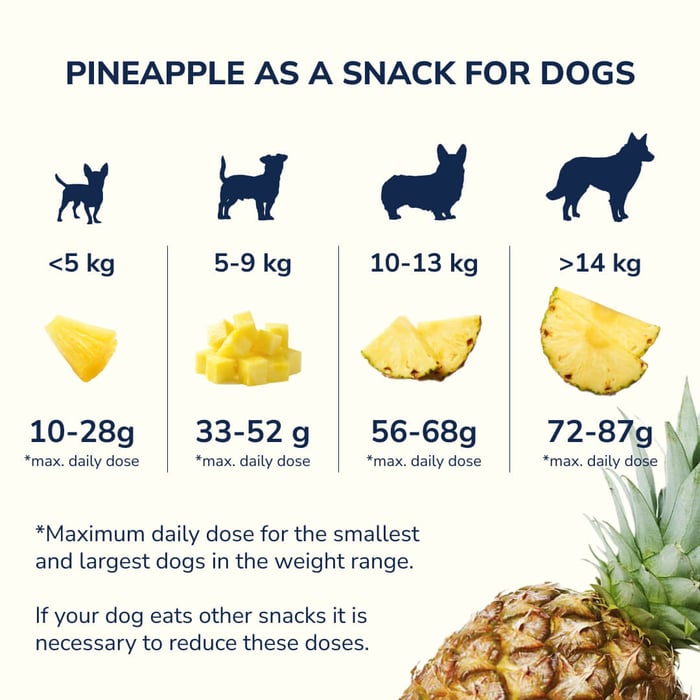
How to Safely Feed Pineapple to Dogs
If you decide to share some pineapple with your dog, there are a few important steps to follow to ensure that it’s a safe and healthy treat.
1. Serve Fresh Pineapple
The best option is fresh pineapple, which retains all the natural nutrients and enzymes that make it beneficial. Be sure to remove the spiny skin and the hard core before offering it to your dog, as these parts are difficult to digest and could pose a choking hazard.
2. Avoid Canned Pineapple
Canned pineapple is often packed in syrup, which contains added sugars that can be harmful to dogs. Excess sugar consumption can lead to dental problems, obesity, and an increased risk of diabetes. Always choose fresh over canned when possible.
3. Serve in Moderation
Pineapple for dogs should only be served in small quantities—think of it as a treat rather than a staple food. A few bite-sized chunks are sufficient. As a rule of thumb, treats (including pineapple) should only make up around 10% of your dog’s daily calorie intake.
4. Monitor Your Dog’s Reaction
As with any new food, it’s crucial to monitor your dog’s reaction after feeding them pineapple. Watch for signs of digestive discomfort, such as bloating, diarrhea, or vomiting. If you notice any of these symptoms, discontinue feeding and consult your veterinarian.
5. Creative Ways to Serve Pineapple for Dogs
Want to add a twist to the way you serve pineapple to your dog? Here are some fun and creative ways to incorporate pineapple into their diet:
A Sweet Note to a Warm Meal: If you cook for your dog, try adding a small piece of pineapple for a subtle, sweet touch that elevates the meal.
Midday Snack with Cottage Cheese: Combine bite-sized pieces of pineapple with some cottage cheese to create a refreshing and nutritious midday snack.
When to Avoid Pineapple for Dogs Altogether
Despite its many benefits, there are certain situations where pineapple may not be suitable for your dog. It’s important to avoid giving pineapple to dogs with the following conditions:
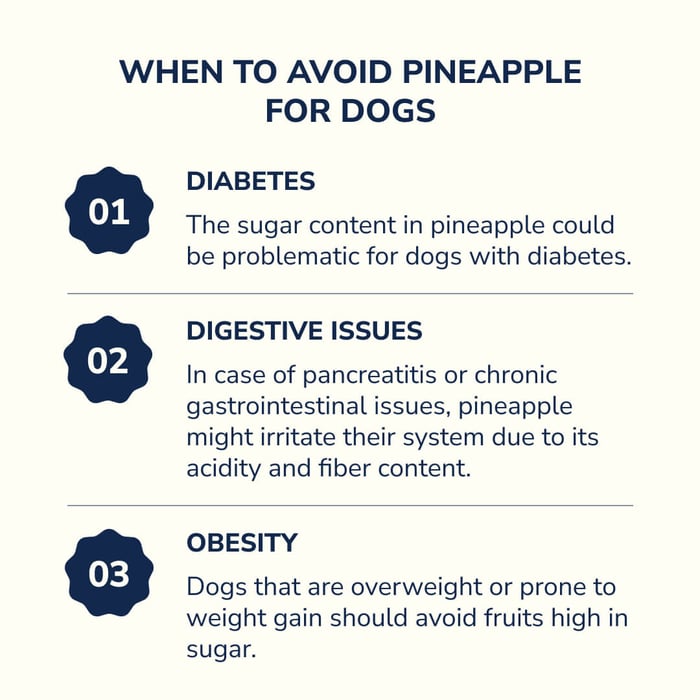
1. Diabetes
As mentioned earlier, the sugar content in pineapple could be problematic for dogs with diabetes, potentially leading to dangerous blood sugar fluctuations.
2. Digestive Issues
If your dog has a history of pancreatitis or suffers from chronic gastrointestinal issues, pineapple might irritate their system due to its acidity and fiber content.
3. Obesity
Dogs that are overweight or prone to weight gain should avoid fruits high in sugar. In these cases, low-calorie vegetables like cucumber or green beans may be better treat options.
Conclusion: Pineapple—A Tasty, Nutrient-Packed Treat (in Moderation!)
So, is pineapple a healthy treat for your dog? The answer is yes—but with caution. When served in moderation, fresh pineapple can be a nutritious, hydrating snack that provides valuable vitamins, fiber, and antioxidants. However, it’s crucial to be mindful of your dog’s individual health needs and ensure that you avoid the pitfalls of overfeeding or offering inappropriate forms like canned pineapple.
By making informed choices, you can offer your dog the best possible care while treating them to the occasional tropical delight!
At LOONAWELL, we believe that your dog’s diet should reflect the same high standards you hold for your own nutrition. That’s why we prioritize transparency, quality, and well-being in everything we create. Explore our range of ultra-premium dog foods, designed with the finest ingredients for a healthier, happier dog.
